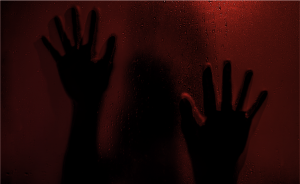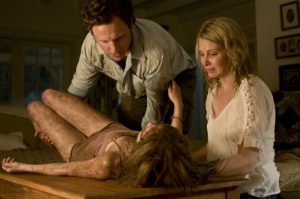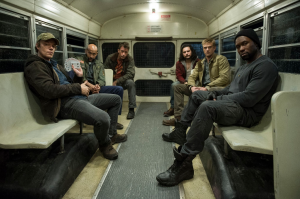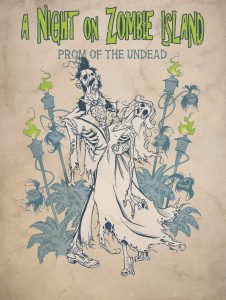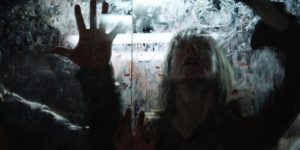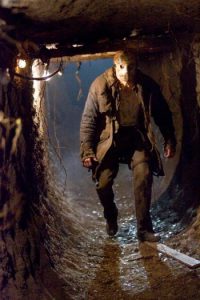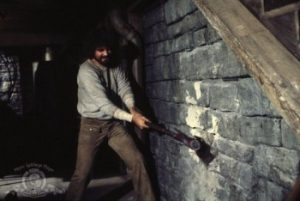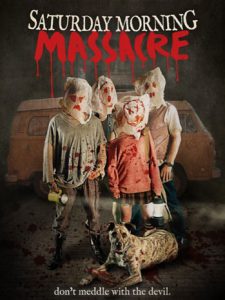
Top Ten Underrated Episodes of The Twilight Zone
This month marks the 50th anniversary since the end of The Twilight Zone’s fifth and final season (“The Bewitchin’ Pool”, the last new episode, aired on June 19th, 1964, though the series remained in reruns throughout that summer). So how to celebrate this lamentable occasion? A roundup of favorite titles like “The Howling Man”, “The Monsters are Due on Maple Street”, and “Nightmare at 20,000 Feet” could be in order. But that seems a bit too predictable for a show renowned for its twists, doesn’t it? Instead, let’s explore ten of the most underrated episodes from the horror/sci-fi series that changed television forever.
The Encounter
Why It’s Probably Overlooked: The controversy inspired by the episode—complaints poured in over its reference to a treasonous Japanese immigrant at Pearl Harbor—caused the network to pull it shortly after broadcast, and the episode never went into syndication.
Why It Should Be Remembered: Well, the inimitable George Takei for one. Pre-Sulu, he starred in this episode as a Japanese-American gardener who faces off with a lonely former soldier who fought in the Pacific. Both men harbor secrets about the war, and naturally, by the time it’s over, they’ve divulged every despondent detail. At the center of the episode is the supernatural sword that inspires them to turn on each other, even if they don’t want to. “The Encounter” explores the perils of xenophobia and cowing to authority, issues just as salient today as they were after World War II. A taut tale from opening shot to Banzai final scene, this is not the “happily ever after” variety of The Twilight Zone, but it’s a story worth trekking through (see what I did there?).

The Passersby
Why It’s Probably Overlooked: My guess would be the slow-moving pace, but there’s not a clear reason why people disregard this Serling-scribed gem. Perhaps it’s the ditching of aliens and monsters in favor of Abraham Lincoln. Yeah, that might be it.
Why It Should Be Remembered: All on its own, the intricate production design catapults “The Passersby” into the stratosphere of the sixth dimension. But what makes this one of the most sublimely evocative episodes of the series are the stellar performances by James Gregory and Joanne Linville coupled with a pervading sense of antebellum melancholy. It’s the end of the Civil War, and defeated Confederate soldiers stream past Lavinia Godwin’s decrepit mansion. But the audience knows this plantation and the adjacent road reside squarely in the Twilight Zone, so obviously, something strange is afoot.
As with most entries in the series, larger ontological issues are at play as the characters cope with their festering hatred against the Yankees that savaged their lands and their men. Given that Serling crafted this one, you can fairly guess that one way or another, the people will have learned the error in their thinking by his end narration. But just like the episode’s lost souls trudging down the dirt road, “The Passersby” is quite a haunting and arduous journey. It’s dark, it’s beautiful, and it’s poignant, all of the things that set The Twilight Zone apart from its television contemporaries and cements it in our consciousness today.

A Nice Place to Visit
Why It’s Probably Overlooked: Very little distinguishes this episode, and even the macabre final twist reduces the whole thing to one long joke.
Why It Should Be Remembered: However, “A Nice Place to Visit” works entirely because of that ending. When I viewed this episode as a kid, it was the first time I ever pondered the ennui of the afterlife, and I realized even then that such musings were not confined to the Twilight Zone. Although as an adult, you can easily predict the real identity of Sebastian Cabot’s man in white from his first appearance, that doesn’t diminish the conundrum the episode presents: if hell is getting exactly what you want but becoming bored with it, then what exactly is heaven? It’s a philosophical quandary we mortals may never truly solve.

The Last Rites of Jeff Myrtlebank
Why It’s Probably Overlooked: The episode’s somewhat goofy “hero” doesn’t quite mesh with the darker life-after-death undertones at play.
Why It Should Be Remembered: Unlike other series, from week to week, Twilight Zone viewers wouldn’t know for certain where in the world—or the universe at large—they’d be transported. Plenty of episodes used negligible sets, some as small as a single room. But in “Last Rites”, we arrive in the southern part of the Midwest (meaning…. Cincinnati?), which looks suspiciously similar to the locale in another James Best episode: the Blue Ridge Mountain bewitched love story, “Jess-Belle”.
Even so, the wide open space serves this spooky tome well. A zombie of a different sort, the once lazy Jeff Myrtlebank awakens at his own funeral, hungry not for brains but for a hard day’s labor. Understandably, the townspeople, including his parents and his fiancée Comfort, fear a demon has inhabited his body. And it turns out they might be right. The ambiance elicits a down-on-the farm home cooked earnestness, something like what you assume Cracker Barrel aims to recapture with that Adirondack-laden porch. However, “The Last Rites of Jeff Myrtlebank” threads an undercurrent of menace through every scene. And that end narration by Serling is among the best of the series. After all, it might singlehandedly explain how American politics got to be so bad.

The Gift
Why It’s Probably Overlooked: Contrived and maudlin, the performances and the dialogue are far below the series’ standard, and the “poor Mexican village” stock setting feels dated and insensitive in retrospect.
Why It Should Be Remembered: Mawkish (and offensive) moments aside, this allegorical tale does have some marginal appeal. Fear of the “Other” is on full display as a Christ-like alien arrives to offer humanity a gift but finds himself attacked from every angle by the terrified villagers. Things don’t get better from there. But it’s the contents of a metal case—the titular offering—that leaves the torch-toting mob crestfallen and ashamed for their actions. Another episode written by Serling himself, “The Gift” moves slowly, sometimes sluggishly, but this is a rare example of the series exploring religious themes without reducing them to a punch line (remember the episode where the two leads turn out to be Adam and Eve? Yeah, that was sad.) However, truth be told, when I re-watched this episode recently, I realized I enjoyed it much more when I was a kid. Serling endeavors to say that small town small mindedness is the same everywhere—whether it’s in America or another country—but his success here is certainly up for interpretation. If you haven’t seen the episode, watch and decide for yourself.

Come Wander with Me
Why It’s Probably Overlooked: The surreal style, dated slang, and nonsensical plot might be somewhat off-putting for modern viewers.
Why It Should Be Remembered: Two words: Bonnie Beecher.
As naïve country girl Mary Rachel, the stunning Beecher dominates every scene with such an ethereal vibe you can almost believe she dropped out of the sky from an alternate dimension. Add to the mix the fact she can sing a folk song like a pro—which makes perfect sense when you realize she hung out with frickin’ Bob Dylan before he was famous, and she even served as the inspiration for his tune, “Girl From the North Country”. Her music cred cuts so deep that she can lay claim to being involved with the original Woodstock, mostly due to her longtime marriage to famed folk oddball Wavy Gravy. This girl was involved in everything during the 1960s—she even costarred in an episode of Star Trek—and chances are you’ve never even heard her name before this article.
Still, you don’t need her sterling credentials to become completely enchanted with her small screen persona. In “Come Wander with Me”, Bing Crosby’s no-name son plays the so-called hero Floyd Burney, a cad of extraordinary proportions, and though his performance is passable, he pales in the presence of Beecher. Directed by Richard Donner, this episode is difficult to wrap your head around, and parts of it make downright no sense, but that’s okay. If nothing else, it’s the only entry in The Twilight Zone canon that boasts an eponymous song you’ll be whistling long after the credits roll. Haunting indeed.

Spur of the Moment
Why It’s Probably Overlooked: The soap operatic love triangle and morose tone from start to finish blight an otherwise fascinating exploration of regret and time travel, two motifs that dovetail far better than you’d think.
Why It Should Be Remembered: The final season of The Twilight Zone is sometimes regarded as more hit-or-miss than the first three seasons (due to a format change, the fourth was just an overlong, hot mess). But that doesn’t mean the series didn’t pull out all the stops for its big finish. Richard Matheson penned this story of equestrian Anne Henderson who takes her horse for a ride around her family’s illustrious property, only to be chased by a seemingly malevolent figure in black. But as the story unfolds, it becomes clear this harbinger was trying to warn the young woman not to marry the wrong man. As you can guess, she doesn’t recognize the admonition and condemns herself to repeat the moment over and over again.
On closer examination, “Spur of the Moment” makes a perfect companion piece to “Come Wander with Me”. Mostly forgotten, both episodes deal with time-as-a-mobius-strip themes and spotlight fascinating female characters who are doomed endlessly to relive their tragedies. Assuming the dual roles of Anne, at both 18 and 43, Diana Hyland demonstrated her acting prowess with aplomb, even if it is obvious she enjoys the darker version of her character better. Perhaps most heartrending, in real-life, Hyland didn’t live as long as her character, succumbing to breast cancer at age forty-one. A tragic end to a young life and promising career.

Deaths-Head Revisited
Why It’s Probably Overlooked: Who’s up for spending twenty-five minutes with an unrepentant Nazi general? Anyone? Anyone?
Why It Should Be Remembered: Serling was always on top of his game when the episodes contained overt political tones, and these post-World War II themes were still very recent memories for many in the early 1960s. When German General Gunther Lutze—with a name like that, you know he’s going to be evil—returns to Dachau concentration camp to reminisce, he meets Becker, one of the Jewish men he used to torture (and as it turns out, killed). So begins Lutz’s descent into purgatory, a place the audience figures he will reside for a long, long time. Atmospheric and unrelenting, this is a dark tale of revenge, but one that leaves the viewer as satisfied as anything so closely based in macabre realism possibly could.

Two
Why It’s Probably Overlooked: As perhaps the most recognizable title on this list, “Two” often gets forgotten next to its more extravagant or politically-conscious counterparts.
Why It Should Be Remembered: Most attempts at romances end rather poorly—or syrupy—in The Twilight Zone, so the fact that the love story angle doesn’t entirely derail “Two” is really saying something. Charles Bronson and Elizabeth Montgomery play the only pair of survivors in a nuclear-wasted city. Unfortunately, they fought on opposing sides during the war, so their relationship doesn’t go quite so smoothly at first. What could have been a major contrivance at every turn ultimately becomes a transcendent exploration into bridging our differences. Plus, nobody can do an apocalypse like this series. Using an abandoned studio set that had fallen into disrepair, “Two” looks, acts, and feels like the world has come to a grinding halt. But even then, this episode posits that life—and love—can still persevere. Though reductionist, that’s a message that resonates even a half-century later.

The Fear
Why It’s Probably Overlooked: The blow-up monster. Really. I’m not making that up. The monster turns out to be a balloon.
Why It Should Be Remembered: First off, it’s got Hazel Court, one of Hammer Films’ coolest and most beautiful actresses, so that’s more than adequate compensation for the oddball choice of “villains”. For a series that centered on fear, this is one of the only episodes that overtly discussed the most primal of human emotions. And under the tutelage of Serling’s razor-sharp dialogue, Court’s Charlotte Scott and Mark Richman’s Trooper Robert Franklin explore the nature of neuroses and confront their innermost dread as a creature from outer space attempts to terrorize them at a secluded mountain cabin. Awkward finale aside, the episode draws its strength from the palpable suspense building and the strong dynamic between the two leads. Just remember to ignore the corny B-movie monster, and everything will be fine.

What underrated Twilight Zone episode do you love? Let me know in the comments below!



